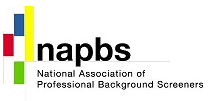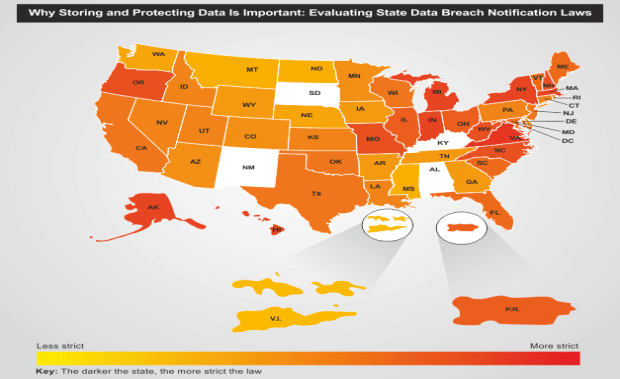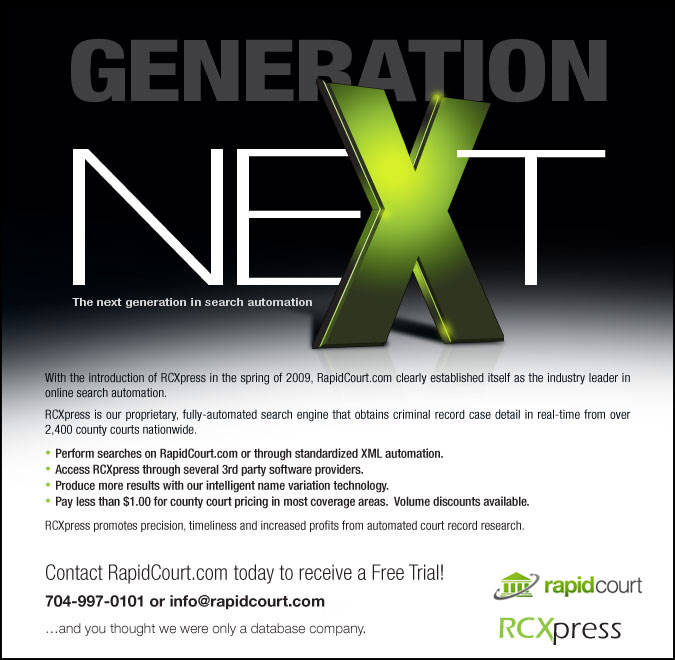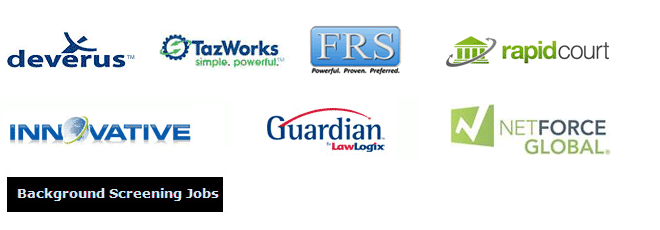| BACKGROUND
SCREENING NEWS |
Criminal
Background Checks: Good in Theory, Problems in Practice
One of
the longest held axioms in social science is, "The best predictor
of future behavior is past behavior." Over the years many employers
have increasingly relied upon criminal background checks as
the principle strategy used to screen out potentially risky
hires from the workforce. The problem is, as expressed by another
axiom of behavioral science, namely, "People often make bad
decisions early in life." These bad decisions, which they later
regret, usually are not permanent. People can recover, rehabilitate
themselves, and turn their lives around.
In making
hiring decisions, Richard C Hollinger, Ph.D. states that "find
ourselves at the horns of a dilemma. Most people who are convicted
of a crime, especially property offenses, will never offend
again and not become a threat to society. The problem is that
we do not have very good tools to predict who will be successfully
rehabilitated and who will offend again. As such, most employers,
on the advice of legal counsel and risk management, choose to
err on the conservative side of this question. This means, if
a person has been convicted in their past, we generally exclude
these individuals as candidates for employment forever. The
net effect of this policy is gross discrimination. This is especially
true for those who have used drugs, stolen anything, and who
are male minorities, particularly true for African American
males."
Dr. Hollinger
hopes that the retail industry will embrace and implement the
new EEOC guidelines to change their present hiring policies.
He also asserts that social science research literature supports
the new EEOC hiring guidelines. Moreover, he states that one
could argue that the industry that hires the largest number
of employees in our country should be the one to lead the rest
of the nation in reducing the level of racial, ethnic, gender,
sexual orientation, and other forms of unwarranted discrimination.
Read More

LexisNexis
Screening Solutions Portfolio to Symphony Technology Group
LexisNexis®
Risk Solutions today announced it has entered into a definitive
agreement to sell its LexisNexis screening business to the Palo
Alto-based private equity firm Symphony Technology Group (STG).
STG plans to combine LexisNexis screening with its portfolio
company, First Advantage, to create a global leader in talent
acquisition solutions.
"The decision
to sell the screening business came after a careful review of
the needs of the business and the strategic goals we have in
place," said Mark Kelsey, CEO, LexisNexis Risk Solutions. "While
the screening business has been a significant offering within
the LexisNexis portfolio, there is greater long-term opportunity
for the business with an organization like First Advantage,
which is focused on bringing background screening solutions
to the marketplace."
To read
more visit: www.symphonytg.com.

 |
NAPBS'
First Executive Director, Tracy Seabrook (Kimbro) Killed
in Motorcycle Accident
I
am saddened to report that Tracy Seabrook (Kimbro), the
first NAPBS Executive Director perished in a motorcycle
accident on January 6thalong with her husband,
in Southern Florida. She was a true contributor to the
success and growth of NAPBS as well as friend to many
in the industry. Our deepest sympathy and prayers go out
to her family, friends and colleagues.
|

What
Bad Hires Really Cost Companies
According to a new CareerBuilder
study, 69 percent of employers report that their companies
have been adversely affected by a bad hire this year, with 41
percent of those businesses estimating the cost to be more than
$25,000, and 24 percent saying a bad hire cost them more than
$50,000. "Whether it's a negative attitude, lack of follow through
or other concern, the impact of a bad hire is significant,"
says Rosemary Haefner, vice president of human resources at
CareerBuilder. "Not only can it create productivity and morale
issues, it can also affect the bottom line."
Why
do bad hires happen to good people?
When asked what accounted for the bad hire, survey participants
report the following reasons that led to their hiring mistakes:
- Needed
to fill the job quickly (43 percent)
- Insufficient
talent intelligence (22 percent)
- Sourcing
techniques need to be adjusted per open position (13 percent)
- Fewer
recruiters to help review applications (10 percent)
- Failure
to check references (9 percent)
- Lack
of strong employment brand (8 percent)
Twenty-six
percent of employers say they weren't sure why they made a bad
hire and that sometimes you just make a mistake.
Read
More



Liars
Index® Continues to Decline, Lyin' King Chosen
The rate
of misrepresentation of education claims on resumes, calculated
semi-annually as the Liars Index®, fell back
again in the second half of 2012, declining to 14.00 percent,
the lowest semi-annual calculation in four years.
The rolling
average for the last two years moderated to 20.75 percent, the
lowest rate since mid-2011. There have been noticeable press
reports over the past year regarding misrepresentations of academic
credentials.
When attention
is drawn to cases where candidates' education claims do not
match up with the school record, seekers
may be inclined to correct the record on their resumes. But
when the CEO of a major public company fails
to correct the firm's public announcement of education credentials,
people will take notice and wonder what other
career facts may need to be verified.

Reprinted
with permission of Jude M. Werra & Associates, LLC. All
right reserved.
Read More

Media
Screening Can Help to Avoid Brand Damage Through a Bad Hire
Many companies
are now looking to add media screening when hiring at the executive
level. Media screening is a comprehensive search through various
databases to access thousands of news sources including newspapers,
trade publications, professional journals, articles, transcripts,
etc. The results of this search can include award nominations
and other achievements by the applicant, community and industry
association involvement, business and job disputes, references
to criminal activity, or other potentially negative information.
It is important to note that media screening is not the same
as social media screening. Media screening practices go beyond
what the potential employee shares with you during the interview
but don't cross the line into the "personal" aspect of social
media checks. Media searches can complement your background
screening efforts by providing information about incidents or
investigations that may not be reflected in official records
and can also highlight the positives about an individual that
might not come through in the interview process. Employers may
want to give more weight to information that has been "published"
versus what has been "posted."
Read more

KCTV
Investigates: Houses of Horror
A KCTV5'
investigative reporter followed a Kansas City family as they
have moved from one rental home to another in the Kansas City
area. And each time, they left the rental home trashed. Reports
were received about the deplorable conditions and extensive
damages caused by the family being tracked.
In 2010,
the Sibell family rented a Kearney home to this famille. Kristie
Sibell recounted to KCTV5 how the family caused $30,000 in damage
by basically turning her house into a dog kennel.
"Everything
was covered in dog feces," she said.In January, Travis Matteson
gave Anderson a tour inside the home his parents had rented
to the Dalmans. During the tour, Matteson showed that every
room was destroyed and covered in feces and filth. The conditions
were so bad that both Matteson and the KCTV5 photographer who
came along to shoot the conditions had fleas from just being
inside.
The family
stopped paying rent and eventually left the house in ruin.
A police
officer involved in the case says most police departments across
the metro offer free classes to landlords on dealing with tenants
and avoiding nightmare scenarios. His advice, in the meantime,
Smarker has some advice. First and foremost, he says pay a professional
company to do tenant background checks. Collect all money before
handing over any keys. And make sure your lease is up to date
and legal for your state. The rules change over time and differ
between Missouri and Kansas.
Read
More

| DATA
PROTECTION & PRIVACY |
Privacy
Trends 2013: The Uphill Climb Continues
A recent report by Ernst & Young detailed privacy's
increasing effect on businesses in the new year. The report
highlights three primary categories that the firm predicts will
shape the new privacy era: governance, technology and regulation.
In the past 15 years, privacy regulations have had to evolve
quickly to address operational and lifestyle changes that technology
has brought forth. Privacy regulators are doing everything they
can to keep up, but as technology's evolution accelerates, regulators
continue to fall behind. Cyber attacks, inappropriate online
etiquette and the oversharing of personal information - these
are just a few of the issues organizations need to navigate
and regulate not only internally, but also on behalf of consumers
who may not know better. The report calls on organizations and
regulators to work together to shape privacy within the digital
landscape and to appreciate the governance role they must play
in safeguarding personal information.
Read
more

More Than Half of In-house Counsel Say Data Security
is Their Top Legal Concern
A recent Ponemon Institute study found the average annual cost
of cybercrime was $8.9 million per year per company. The companies
in the study experienced on average 1.8 successful cyber-attacks
per week. The frequency of such incidents has made data security
the top legal concern of 55% of in-house counsel, according
to the 2012 Law and the Boardroom Study by Corporate Board Member
and FTI Consulting. A plethora of federal and state laws designed
to protect consumers also has helped push data protection to
the top of the compliance priority list. Businesses and criminals
are constantly working against each other to come up with the
latest technology to thwart the other in this area. However,
not all data theft is high-tech. The improper disposal of documents
containing sensitive data, such as in unsecured trash containers
that are accessible to the public, violates federal rules protecting
consumer information against trash-diving identity thieves.
Doing the right thing starts with encryption, the process of
encoding information so it is unreadable to hackers. The safe
harbor only applies if the decryption keys that allow the data
to be viewed are not compromised. Therefore, strong key management
is essential. Experts also strongly recommend encryption for
mobile devices, which are easily stolen.
Read more

| Welcome
to the U.S. Legal Challenge Question! |
Sponsored By:


As the background
screening industry continues to get more competitive the firms
that will ultimately succeed will be those that create competitive
advantage through their people by offering continuous learning
opportunities to heightened their knowledge and capabilities.
We believe that having employees that are very knowledgeable about
the legal landscape of background screening is essential to continued
success.
We are grateful
to Pam Devata, Seyfarth Shaw
LLP for providing the expertise for this valuable endeavor.
For information regarding the answers to the Legal Challenge Questions,
please contact Pamela Devata at Seyfarth Shaw LLP at pdevata@seyfarth.com
or 312-460-5000 or visit www.seyfarth.com.
Please choose
your answer by clicking on it:

Four
Words the Fair Credit Reporting Act has Class Action Plaintiffs
and Their Lawyers Repeating: "Show Me the Money!"
Over the
past few years, the Fair Credit Reporting Act (FCRA), the federal
law mandating, among other things, procedures and reporting requirements
employers must follow when conducting background checks through
a third party vendor, has become a hot-button employment issue,
and a lucrative one for class action plaintiff attorneys. Similar
to other class actions involving technical violations, like wage
and hour and "seating" lawsuits, plaintiff class action attorneys
have latched on to technical requirements in the law providing
for statutory damages when violated. The motivation driving these
lawsuits? The promise of easy money. With the potential to collect
statutory damages, the possibility of punitive damages, and the
ability to obtain attorneys' fees and costs, the FCRA can be a
class action plaintiff's lawyer's dream. Class action plaintiffs
and their attorneys have increased the filing of class action
lawsuits alleging willful violations of the FCRA, and this trend
is not slowing. Employers should take steps to ensure compliance
with the FCRA to reduce the risk of class action claims seeking
statutory penalties.
Read more

New Law on Expunging Records Helps Michigan's
Juvenile Offenders Make a Clean Start
Juvenile
offenders can now get their criminal records expunged under a
bill that received rare, unanimous agreement in the Michigan legislature.
The law allows juvenile offenders to request that their records
be cleared if they have three or fewer misdemeanors or one felony
conviction. Prior rules allowed for the request on only one misdemeanor.
Offenders will also be able to ask that their records be cleared
one year after they've completed their sentence and probation,
instead of the current five years. If they committed a crime that
would be punishable by life in prison in the adult court system,
they aren't eligible to get their record cleared. People with
juvenile records often struggle with finding jobs, getting into
college or entering the military due to their records, even if
their records have been clean for years.
"Everyone is so gun-shy on this because they think we need to
be tough on crime, and it's politically correct to be tough on
crime," said the law's sponsor, Rep. Joe Haveman. "But we can
certainly look at alternatives if people are behaving themselves.
Then they can be paying taxes instead of draining taxes."
Read More

Use
of Credit Information in Employment 2012 Legislation
As of November
16, 2012 40 bills in 19 states and the District of Columbia have
introduced or have pending in legislative session. Out of the
total 41 bills, 40 address restrictions on the use of credit information
in employment decisions. The total number of states that limit
employers' use of credit information in employment is now eight:
California, Connecticut, Hawaii, Illinois, Maryland, Oregon, Vermont
and Washington. Washington enacted legislation
in 2007, Hawaii
enacted legislation in 2009, Illinois
and Oregon
enacted legislation in 2010. California , Connecticut and Maryland enacted legislation in
2011. Vermont
enacted its legislation in 2012.
To see the
full chart on credit check laws go to
http://www.ncsl.org/issues-research/banking/use-of-credit-info-in-employ-2012-legis.aspx

Is A Convicted Felon Absolutely Barred From Practicing or Engaging
In Any Trade, Occupation, or Profession For Which a License, Permit,
Or Certificate Is Required To Be Issued By The State Of Louisiana?
According
to Act No. 486, which amended and reenacted LSA-R.S. 37:2950(A),
a convicted felon shall no longer be disqualified, or held ineligible
to practice or engage in any trade, occupation, or profession
for which a license, permit, or certificate is required to be
issued by Louisiana, or any of its agencies or political subdivisions,
unlesssuch a conviction "directly relates to the position of employment
sought, or to the specific occupation, trade, or profession for
which the license, permit, or certificate is sought.".
Source: http://www.ogletreedeakins.com/publications/2012-12-13/convicted-felon-absolutely-barred-practicing-or-engaging-any-trade-occupatio
Note:
This article was published in the
December 2012 issue of the Louisiana eAuthority.

Marketers of Criminal Background Screening Reports To Settle FTC
Charges They Violated Fair Credit Reporting Act
According
to an administrative
complaint filed by the FTC , Filiquarian Publishing LLC, Choice
Level LLC, and their CEO, Joshua Linsk, failed to ensure that
the information they sold was accurate and would be used only
for legally permissible purposes. The FTC also alleged that they
failed to tell users of their criminal record reports about their
obligations under the FCRA, including the requirement to notify
consumers if an adverse action was taken against them based on
a report. According to the FTC, Filiquarian claimed consumers
could use its mobile apps to access hundreds of thousands of criminal
records and conduct searches on potential employees. One app stated,
"Are you hiring somebody and wanting to quickly find out if they
have a record?
The settlement
order bars the respondents from furnishing a consumer report to
anyone they do not have reason to believe has a "permissible purpose"
to use the report, failing to take reasonable steps to ensure
the maximum possible accuracy of the information conveyed in its
reports, and failing to provide users of its reports with information
about their obligations under the FCRA.
Read
More

Social
media bills would defend online privacy
With the
emergence of new technology, legislators have filed a bevy of
bills that could change the way some Texans use social media.
The measures largely stem from lawmakers' concerns about privacy
and safety for Texans who spend an increasingly large portion
of their lives online.
Helen Giddings
(D-Dallas) proposal, House Bill 318, would "prohibit employers
from requiring or requesting access to personal accounts of employees
or job applicants through electronic communication devices." Her
proposal would include personal cellphones, computers and social
media accounts, such as Facebook or Twitter.
Her bill
would protect personal accounts of employees, but it would not
apply to devices owned by a company that the employee uses to
conduct business.
Lawmakers
in Missouri and Vermont, along with Texas, have filed social media
measures this year.
Read More




We are proud
to introduce our new SaaS+ Enterprise Architecture that is comprised
of the very latest Dell enterprise Blade Servers, a high-performance
Storage Area Network, the industries fastest data networking gear
from Cisco, and is backed up by one of the most complete and established
cloud providers in the market.
Until the introduction of our SaaS+ Enterprise Architecture, the
background screening software industry was run on towers, classic
rack-mounts, or even worse yet - unsecured PC platforms. These
technologies were well behind the pace set by HireRight, Sterling,
TalentWise, ADP, and other major competitors. Going head-to-head
with them with such feeble technology solutions was almost assuredly
placing you out of contention. With deverus' SaaS+ Enterprise
Architecture, you now have the technology to compete with anyone
in the industry in terms of Performance, Reliability, Scalability,
and Security! Please go to our all new website to learn more,
www.deverus.com.

Inquirehire Achieves Background Screening Credentialing Council
Accreditation
The National Association of Professional Background Screeners
(NAPBS®) Background Screening Credentialing Council (BSCC)
announced that Inquirehire has successfully proved compliance
with the Background Screening Agency Accreditation Program (BSAAP)
and will now be formally recognized as BSCC Accredited.
Inquirehire
is a leading national provider of human resources solutions that
include background screening, drug testing, assessment testing,
and human resources management systems. Inquirehire solutions
are fully integrated and web-based to help employers manage risk
more effectively while reducing cost, saving time, and improving
quality throughout their hiring and overall human resources operations.
Inquirehire is a founding member of NAPBS® and Concerned
CRAs. For more information about Inquirehire, visit www.inquirehire.com.

| DATA
PROTECTION & PRIVACY - continued |
Imation
Map of State Data Breach Notification Laws Spotlights Need for
Storing and Protecting Sensitive Information
Imation Corp . a global scalable
storage and data security company, released results of research
into state data breach notification laws and associated penalties.
The analysis shows that current state data breach notification
laws are strikingly similar, but vary in compliance requirements
for businesses, with all laws highlighting the need for companies
to deploy methods for closely storing, protecting and controlling
sensitive information. Imation used publicly available sites (including
information obtained via the National Conference of State Legislatures
) to analyze state compliance laws in the 46 U.S. states
that have such laws, as well as in Puerto Rico, the District of
Columbia and the U.S. Virgin Islands.
Imation created a "Compliance Heat Map" to depict the strictness
of data breach laws and resulting penalties for breaches. The
Compliance Heat Map provides a visual snapshot of the strictness
of regulations by state, using a color scale ranging from light
yellow (less strict) to dark red (more strict). "What the compliance
heat map tells us is that data security needs to be at top of
mind for all IT pros, as there are rules in place for nearly all
states and territories and non-compliance could mean serious penalties,"
said David Duncan, software & security solutions marketing
director, Imation.

Read more

Public
Record Update
Sponsored by:

Public
Record Update
By Mike Sankey, PRRN
| National
Credit Reporting Association (NCRA) Changes Name |
Effective
January 1, 2013 the National Credit Reporting Association (NCRA)
changed its name to the National Consumer Reporting Association.
This is the second growth-related name change in NCRA's 20 year
history. The organization was founded in 1992 as the National
Association of Independent Credit Reporting Agencies (NAICRA).
The name change
is a response to better representation of the membership's growing
business model. While a majority of NCRA's original membership
provides credit reports to the mortgage lending industry, many
members provide a wider range of services. A number of NCRA members
work with the multi-family housing industry by providing credit
reports, eviction records, and criminal background histories for
landlords and property managers making rental decisions. Some
NCRA members also provide full service background screening.
NCRA's personnel,
as well as physical and web addresses will all remain the same.
For more information visit www.ncrainc.org
or contact the NCRA Executive Director Terry Clemans at tclemans@ncrainc.org.
Search Tip:
Researching a web page of a trade association is a good way to
find industry news, vendors, or even perspective new clients.
To see a list of 88 trade associations that touch on some aspect
of public records, visit
this BRB site.
1. We Now Have
New, Extensive Material at brbpublications.com
The key BRB sub pages, such as the page with the free searches at
government sites have been broadly changed. The page with the free
county and state sites now includes addresses, phone numbers,
and home pages for courts and recorders offices, as well as a list
of URLs with record searching. There are also 20+ state agencies
listed for each state, plus all of their free search sites.
We have recently updated other educational pages including the Articles
page and the Links
and Resources page. Also, did you know our State
Occupational Licensing Boards page shows links to names and
enforcement actions on over 5,000 occupations or business types?
We go to great lengths for our subscriber clients who see the full,
much deeper data "behind the wall." They see facts and
subjective information you cannot find using Google. But providing
the "Reader's Digest Version" of the free searchable sites
to the public is our way to let you know BRB is are more than just
a links list site.
2. The BRB Home Page is NOT www.brbpub.com
We receive several questions every week about the content at www.brbpub.com.
Generally we are asked why does it have "x" or how come
we are selling record searches. We don't. Since late 2010, this
URL is owned by the good folks at Inflection, and not by BRB. This
site does provide an extensive array of free public records links
and it does offer excellent several record search products. But
to set the record straight, if you have bookmarked brbpub.com thinking
it is a BRB Publications site, it is not our site.

Dayton
Superior Corp Fined for Terminating Employee for Testing Positive
for Medication Required to Treat Disability
Dayton Superior
Corporation, a nationwide provider of concrete and masonry construction
products, will pay $50,000 to settle a disability discrimination
lawsuit brought by the U.S. Equal Employment Opportunity Commission
(EEOC), the agency announced.
The EEOC
charged that Dayton Superior Corporation discriminated against
Chassity Brady, a quality control lab technician in its Braselton,
Ga., facility, by unlawfully firing her in August 2011 for taking
medication that had been prescribed by her doctor for her bipolar
disorder. While at work, Brady suffered an adverse reaction to
the prescribed medication and the employer required her to submit
to a drug test. Although the only substances found in Brady's
system were the medications prescribed to treat her disability,
the employer immediately terminated her after the test results
were revealed.
"The EEOC
filed this case because the evidence indicated Ms. Brady was terminated
because her disability required her to take medication," said
Robert Dawkins, regional attorney for the EEOC's Atlanta District
Office. "Making employment decisions on the basis of stereotypical
assumptions about disability-based medications is one of the problems
the ADA was designed to combat."
Read
more

State
Laws Dictate Drug Testing Policy Content
A well-written, comprehensive drug testing policy is the cornerstone
of any successful program. A good policy accurately reflects a
company's drug testing objectives and clearly articulates prohibited
behavior as well as the consequences for violations of the policy.
It also describes who is subject to drug testing, under what circumstances
testing will occur, and how it will be conducted. Some state laws
require employers to have a written policy in place and mandate
the content of that policy. Additionally, some states require
employers to make the policy available to employees and job applicants.
Not all states have drug testing laws and some that do, do not
have specific policy content requirements. Employers are well
advised to review the state laws that apply to them to ensure
that their drug testing policies meet all applicable legal requirements.
Even if a state's drug testing law does not include a dedicated
section on policy content, the law itself really dictates what
should be included in a workplace drug testing policy. No company
should conduct drug testing without a policy in place. It is imperative
that a policy expert reviews a policy at least annually to ensure
that it still reflects the company's objectives and complies with
all applicable state and federal laws.
Read more

Workers' Comp Premiums and Drug Testing
Medical costs and insurance premiums are on the rise.
Oregon has recently announced that it will be raising base workers'
compensation premiums from 2.8 cents to 3.3 cents per hour (the
amount required before an insurance provider's expenses and profits
are added). This trend holds true in other states. After a dip
in California, rates have been on the rise for the past few years.
While not all states are experiencing an increase in workers'
comp rates, it may be beneficial for employers to be up-to-date
on voluntary state drug testing laws that provide premium discounts.
Some state laws provide a fixed discount like 5%, while others
provide a rolling discount ranging from 4% to 7.5%. As of January
2013, 11 states have voluntary drug testing laws that apply to
non-industry specific employers. Some of these states have created
criteria that insurers must observe, while others have left it
up to insurance providers to determine and enforce criteria. It
may be advantageous for employers to know all they can about these
voluntary state drug testing laws that offer premium discounts.
A carefully constructed drug testing policy can prove not only
a valuable resource but also a great way to save money. Employers
are encouraged to consult each state's law to ensure compliance.
Read more

Medical Marijuana Update
New state
medical marijuana bills are starting to roll out as the legislative
season gets underway. In Arizona, the state Court of Appeals ruled
that the Yuma County sheriff must return marijuana seized from
a California medical marijuana patient. The court said that the
seized medical marijuana must be returned because Arizona's medical
marijuana law allows people with authorizations from other states
to legally possess marijuana in Arizona. Also, state inspectors
gave the okay to the state's first commercial cannabis kitchen.
The kitchen, Heavenly Harvest, provides edibles for patients of
the Green Halo dispensary in Tucson and plans to supply other
dispensaries as they open. In California, San Diego Mayor Bob
Filner stepped up for medical marijuana by halting the prosecution
of dispensaries there, however; federal prosecutors say they are
still going to enforce the Controlled Substances Act. Marijuana
bills have been introduced in Illinois, Kansas and New York, and
a recent poll in New Hampshire found that 68% of voters support
a medical marijuana law in the state.
Read
more

Quick Insight on Utah Drug Testing Law
Utah has
a voluntary drug testing law. Employers that wish to comply may
benefit from limited legal protection. Take a look below to learn
more about Utah's voluntary law and the legal protection it provides
to employers that comply.
Top Three
Things to Know About Legal Protection Provided by Law:
- No cause
of action arises in favor of an individual against an employer
that has complied with the state's voluntary drug testing law,
unless the employer relied upon a false result.
- In the
case of a false result, it is assumed the test result is valid
if the employer has complied with the state's voluntary drug
testing law.
- An employer
is not liable for monetary damages if his or her reliance on
a false test result was reasonable and in good faith.
Source: State Drug Testing Laws Monthly
, A service of StateDrugTestingLaws.com, January 2013, Vol. 1,
No. 6


 Before
joining the background screening industry Shane, who has an engineering
background, worked on SaaS in supply chain management and digital
media distribution. He joined deverus because he not only saw
an immediate connection with his my previous SaaS experiences,
but also saw an opportunity to join a firm that was experiencing
phenomenal growth. Before
joining the background screening industry Shane, who has an engineering
background, worked on SaaS in supply chain management and digital
media distribution. He joined deverus because he not only saw
an immediate connection with his my previous SaaS experiences,
but also saw an opportunity to join a firm that was experiencing
phenomenal growth.
Shane commented that what he enjoys most about the
background screening industry is the personal nature of the entire
process. "Our customers are doing this because they have a passion
for making the workplace a better, safer place and know that the
work they are doing is important," said Shane. "There is a certain
responsibility and special partnership that exists between deverus,
our partners, and the final end-customers (corporations) to protect
their employees."
He stated
that the mission and vision of deverus is to play a crucial role
in setting business processes and technology standards for the
Background Check Industry. He further added that their focus is
on being the most trusted resource of companies around the world
- providing the right resources and strategies for diversification,
competitiveness, and growth.
"We provide
our partners the most powerful, intuitive, and flexible Background
Screening Software solution in the industry with Verocity and
deverus will continue to support companies of all sizes and industries."
However, he noted that his primary focus going forward is providing
their partners with the tools to provide services for the Fortune
5000. "For example, we have more ATS (Applicant Tracking Systems)
integrations than any other software provider. With our unique
Hubworks architecture, we can bring up a new integration with
a company with 10,000+ employees in days, not months. Recently,
Oracle has partnered with us and we are proud to announce we are
part of the worldwide Oracle Partner Network."
"The deverus
Infrastructure is something that we have invested in heavily within
the last year to provide the industries most reliable, secure,
and highest performance system. Our SaaS+ Enterprise Architecture
is comprised of the very latest enterprise Blade Servers, a high-performance
Storage Area Network, the industries fastest data networking gear
in our ISO-9001 colocation in Austin, and is mirrored and backed
up by one of the most complete and established cloud computing
providers in the market, Amazon."
"We thrive
on doing tailored world-class solutions for our partners. Many
SaaS companies tend to shy away from this, but Verocity was actually
designed for this type of flexible and highly configurable approach
to provide the right solution, not just the closest solution."
He emphasized
that deverus is completely committed to being a PARTNER to their
customers and never a COMPETITOR.
In response
to my favorite question: If you could look into a crystal ball,
lets' say ten years down the road, what do you see happening in
the background screening industry? Shane sees, "more automation
and greater integrations across the board to improve efficiencies.
The key will be to have the best delivery model, which we firmly
believe is SaaS for the Background Screening Industry that is
fully compliant and moves data accurately and rapidly throughout
the process. I do see some really great opportunities for Specialized
and Mid-Sized Background Screening Companies to excel with customer
service focused models where some of the "Big 6" Screening Companies
are honestly failing."
On a more
personal note, he just finished reading the book "Guns, Germs,
and Steel" by Jared Diamond, which he describes as a wonderful
take on the evolution of human societies and the history of the
world.
He also indicated
that the person he would have really liked to meet, given the
opportunity, would have been Ronald Reagan. "I would think 15
minutes with him would be priceless. Ending the Cold War, with
'peace through strength' while at the same time really uniting
and revitalizing America. Yes, he would be my choice."
We closed
the interview with his favorite quote: "Never doubt that a small
group of thoughtful committed people can change the world. Indeed,
it is the only thing that ever has." -Margret Mead

One
Site! Many Suppliers! |
Get Your Copy of the Suppliers
Buyers Guide
Looking
for the Top Suppliers in the Industry? Need to find a new Supplier?
Visit our VENDOR
SHOWCASE which features suppliers to the Background
Screening Industry.
2012
Fall Edition of Suppliers to the Background Screening industry
Guide
Now Available!
Click
here or on image to get a copy

Contact
Barry Nixon at wbnixon@aol.com
for information on getting your firm listed in the Summer Edition.

ADP
Reports 215,000 New US Jobs in December
Private-sector
employment increased by 215,000 from November to December, on
a seasonally adjusted basis. Service-providing jobs increased
by 187,000. Among the service industries reported by the ADP
National Employment Report, trade/transportation/utilities
services had the largest gain with 53,000 jobs added over the
month. Professional/business services added 37,000 jobs and financial
activities added 14,000 jobs in December.
Mark Zandi,
chief economist of Moody's Analytics, said, "The job market held
firm in December despite the intensifying fiscal cliff negotiations
in Washington. Businesses even became somewhat more aggressive
in their hiring at year end. Most encouraging is the revival in
construction jobs, although the December gain was likely lifted
by rebuilding after Superstorm Sandy. The job market ended 2012
on a more solid footing."
The report
is based on an anonymous subset of 406,000 ADP clients in the
U.S. which employ more than 23 million U.S. workers.
Read More

The Conference Board Employment Trends Index™
Increased in December
The
Conference Board Employment Trends Index™
(ETI) increased in December. The index now stands at 109.02, up
from 108.19 in November. The December figure is 3.1 percent higher
than a year ago.
"After posting
a significant increase in December, following an upward revision
in November, the Employment Trends Index is improving," said Gad
Levanon, Director of Macroeconomic Research at The Conference
Board. "However, if economic activity continues to expand slowly
in the first half of 2013, it would be difficult for employers
to maintain the current rate of job growth."
Read
More

 Kevin Coy is a Partner in the Washington
DC office of Arnall Golden Gregory LLP. Kevin
advises background screening companies and other clients on a
wide range of privacy and consumer regulatory issues, including
Fair Credit Reporting Act, Gramm Leach Bliley Act, Drivers' Privacy
Protection Act, and Dodd Frank Act compliance issues, as well
as data breach matters. Kevin also represents clients with matters
before the Federal Trade Commission, the Consumer Financial Protection
Bureau, and other consumer protection agencies. Kevin Coy is a Partner in the Washington
DC office of Arnall Golden Gregory LLP. Kevin
advises background screening companies and other clients on a
wide range of privacy and consumer regulatory issues, including
Fair Credit Reporting Act, Gramm Leach Bliley Act, Drivers' Privacy
Protection Act, and Dodd Frank Act compliance issues, as well
as data breach matters. Kevin also represents clients with matters
before the Federal Trade Commission, the Consumer Financial Protection
Bureau, and other consumer protection agencies.
Kevin can
be contacted at Kevin.Coy@agg.com
or 202-677-4034.
Happy New Year
in Washington!
It's January,
and with the beginning of the New Year, this January also brings
the beginning of a new Congress (the 113 th) as well
as President Obama's inauguration for his second term. The new
Congress brings new bills and new members, including Consumer
Financial Protection Bureau (CFPB) architect and now Senator Elizabeth
Warren (D-MA). More new faces in the Senate may be on the way
shortly, with President Obama having nominated Senator John Kerry
to be Secretary of State. Senator Kerry is widely expected to
be confirmed, and he could be succeeded in the Senate temporarily
by former Congressman Barney Frank and permanently by Congressman
Ed Markey, both of whom have long been active on FCRA, background
screening and other privacy and consumer protection measures.
In fact, then-Representative and Chair of House Financial Services
Committee, Mr. Frank led the charge on the Dodd-Frank Act which
created the CFPB. The new Congress is just getting underway, however,
and while background checks are on the agenda, its background
checks for gun sales, not employment or tenant screening that
is dominating the discussion in Washington this month. With that
in mind, the primary focus of this first Washington Report
of the New Year will be the Federal Trade Commission (FTC).
Read
More

STOP
STRUGGLING WITH WRITING AND PUBLISHING YOUR NEWSLETTER: |

We can help
you have a high quality e-newsletter to help nurture your relationship
with your clients and attract new clients. Our customized newsletter
service will take over your newsletter task or create a new one
for you. We can manage the creation of your newsletter for you.
We are constantly
researching information to use for The Background Buzz and
you can put our research to use for you. Using the information
rich content from The Background Buzz (minus the ads
and competitors information) we will create a custom newsletter
for you.
Use your staff’s
time to do more valuable work and save all the hassle of researching
or writing articles, formatting and managing all the other ezine
tasks with our customized ezine process.
Contact Barry
Nixon at 949-770-5264 or at wbnixon@aol.com
for more information.

Employment
Verification Process Has Pitfalls Even in the Absence of Unauthorized
Workers
On January
7, 2013, the United States Department of Justice (DOJ) announced
that Centerplate, Inc. (an international hospitality company)
had agreed to pay a $250,000 civil penalty to resolve allegations
that it violated the anti-discrimination provision of the Immigration
and Nationality Act (INA). Specifically, the DOJ alleged that
Centerplate engaged in a pattern or practice of treating work-eligible
non-citizens differently from U.S. citizens in the employment
eligibility verification process by requesting that non-U.S. citizens
show specific documents to demonstrate work eligibility. In addition
to the civil penalty, Centerplate also agreed to fully compensate
any victims for lost wages. This is reported to be the third largest
settlement to resolve alleged violations of the INA's anti-discrimination
provisions, which have been in effect since 1986. Employers should
always permit employees completing the Form I-9 (whether initially
or as part of an update or rehire) to select and show any acceptable
document, or combination of documents, to demonstrate their identity
and work eligibility. Because the list of acceptable documents
can change, it is important to ensure that the form being used
is always the most current edition.
Read more



I.C.E. Storm in the Forecast - I-9 Compliance
and Employer Liability
There are
times when the simplest of tasks can create the biggest of problems
for employers. We have been seeing such a phenomenon occur over
the past three to four years in the area of I-9 compliance. I-9
audits, or raids, no longer encompass searches for illegal workers
with the goal of deportation. Now, they heavily focus upon the
Form I-9 itself, as well as the employer's role in employing or
retaining illegal workers. Both state and federal governments
view employers as the "root cause of illegal immigration."
Auditors
evaluate these forms, seeking strict compliance. Indeed, on the
federal side, the U.S. Immigration and Customs Enforcement agency
guidance to its field auditors emphasizes using the I-9 audit
process, inter alia, to "advance criminal cases." As strict compliance
is not often the reality, the government has issued a record number
of civil and criminal penalties against employers who fail to
properly complete, maintain and, where necessary, update I-9 forms.
Employers also face liability for employment of illegal workers.
Plainly, our current administration has shifted the focus of immigration
in the employment sector completely. Instead of seeking to remove
illegal workers from our U.S. companies, the federal government
is focused upon punishing employers for their failure to comply
with U.S. immigration laws. Punishment often comes in the way
of heavy fines. The criminal statue also threatens imprisonment.
Read More

States
Take Action on E-Verifty
As of November
30, 2012, a total of 20 states require the use of E-Verify for
at least some public and/or private employers: Alabama, Arizona,
Colorado, Florida, Georgia, Idaho, Indiana, Louisiana, Michigan,
Mississippi, Missouri, Nebraska, North Carolina, Oklahoma, Pennsylvania,
South Carolina, Tennessee, Utah, Virginia, and West Virginia.
Eighteen of these requirements were through legislation and two,
Florida and Idaho, by executive orders. Two states, California
and Illinois, currently limit the use of E-Verify. Other states
are exploring alternatives to E-Verify or identifying safe harbor
provisions. North Dakota is the only state to mandate a Legislative
Management study on the feasibility of mandating the use of E-Verify.
See the state chart below and state by state summary for more
information.
Read
More

CareerBuilder
Releases 2013 Job Forecast for the 10 Largest Global Economies
CareerBuilder's
first annual job forecast for the 10 largest world economies tells
a tale of both confidence and caution. Brazil and India are voicing
the greatest confidence with more than two-thirds of employers
in these markets planning to add full-time, permanent headcount
in 2013. Italy is the least optimistic, housing more employers
who expect to decrease staff than those who expect to hire.
"The job
outlook presents varying degrees of growth and deceleration as
governments and businesses strive to rebuild and expand and deal
with large deficits," said Matt Ferguson, CEO of CareerBuilder.
"Hiring activity in the BRIC countries (Brazil, Russia, India
and China) is projected to be significantly higher than other
markets while recruitment in Europe remains sluggish as leaders
struggle to resolve a debt crisis that has global implications.
The overall hiring picture is improving, but companies will remain
watchful as they navigate headwinds and maneuver through somewhat
precarious economic terrain."
The survey,
conducted by Harris Interactive© from November
1 to November 30, 2012, included more than 6,000 hiring managers
in countries with the largest gross domestic product.
Read More
Drug
Testing Pits Privacy Against Safety
Cases involving
employer drug testing and employee privacy are set for hearings
in two Canadian courts. First, the Alberta Court of Appeal will
hear from an energy company that is arguing against an injunction
preventing the company from implementing random drug testing of
employees. The Supreme Court of Canada will then hear a case involving
a company's plans to have employees submit to mandatory breathalyzer
tests. Unlike the United States, where workplace drug tests are
relatively common, Canada has had little experience with randomly
administered on-the-job tests. Both companies argue the testing
improves job safety, but others argue it infringes on employees'
right to privacy. Ed Secondiak, president of ECS Services - which
has designed drug testing programs for large and small corporations
for 18 years - says there are ways to ensure employees' rights
are respected while still reducing the risk of on-the-job substance
abuse. Employers, safety companies and privacy experts, will watch
each case closely as the courts try to find a balance between
safety on the job and an individual's right to privacy.
Read more

Taxi Company Says Privacy Laws Limit Driver Checks
A St. John's-based taxi company has said that provincial
privacy law is preventing it from accurately checking employees'
driving history. A company representative said his organization
can mandate that drivers produce a certified driving record and
ask drivers to update any changes to their record, but beyond
that, provincial law prevents the company from further investigation.
"They don't give us the power to phone in motor vehicles and ask
for a particular person's driver's license, if it expired or not,"
the representative said. Drivers can give written permission to
have their records checked, but this would cost companies thousands
of dollars every month. The taxi company is calling for a return
to the old system, when a city inspector licensed the drivers.
Unfortunately for the cab companies, however, City Hall is not
interested in going back.
Read more
One
Big Step for Data Protection in China?
The PRC Standardization
Administration issued a national standard entitled the "Information
Security Technology - Guideline for Personal Information Protection
within Information System for Public and Commercial Services"
(the Guidelines) that will take effect on February 1, 2013. The
Ministry of Industry and Information Technology (MIIT), the regulator
of telecom industry in China, first proposed the Guidelines in
January 2011 for public consultation. The Guidelines were a response
to numerous incidents involving the misuse of personal information
in China. Although the Guidelines were proposed by the MIIT and
implemented as a national standard, they are intended to regulate
all organizations and entities on the protection of personal information.
The Guidelines are only applicable to any processing of personal
information that involves the use of an "information system" (e.g.
a computing system). The Guidelines therefore are quite limited
in scope when compared to usual data protection law whereby no
distinction is drawn on whether an information system is involved
or not. Under PRC law, the Guidelines do not have the force of
law because there are no penalties in the event that they are
not complied with.
Read
More
Faster
Growth of Specialist Data Risk Insurance Market Predicted if Proposed
Data Protection Reforms are Introduced, Says Expert
The growth
in the market for specialist data risk insurance will continue
if proposed changes to rules governing the international transfer
of personal information are implemented, an expert has said. There
is ongoing debate over proposed reforms to the EU's existing data
protection law framework ever since the European Commission outlined
formal proposals on the issue in January 2012. The Commission
set out a draft General Data Protection Regulation which would
establish a single data protection law that would apply across
all 27 EU member states and to companies that wish to process
the personal data of EU citizens. MEP Jan Philipp Albrecht's recent
report on the Commission's draft regulation suggests companies
seeking to process data in countries outside of the European Economic
Area that have not been designated as meeting EU standards should
have to provide "financial indemnification" to individuals for
data breaches. The need for insurance products "to transfer risk
for the data processor or controller has grown," said Ian Birdsey,
an insurance law and data risk specialist. "While a standard professional
indemnity policy may have been considered adequate five years
ago, both companies and insurers have appreciated the need for
specialist insurance products dealing with the myriad data risks."
Read more

Binding
Corporate Rules For Processors Available To Use From 1 January
2013
Data processors
will be able to make use of Binding Corporate Rules (BCRs) for
processors effective 1 January 2013 in order to facilitate international
data transfers.
This way of ensuring privacy in international transfers will bring
benefits to both processors and controllers. Once a BCR has been
approved, there is no need to negotiate the safeguards every time
a contract is entered into.
The EU DPA's working document with a detailed description
of BCRs for processors is available at http://ec.europa.eu/justice/data-protection/article-29/documentation/opinion-recommendation/files/2012/wp195_en.pdf
Source; Privacy
Laws & Business info@privacylaws.com,
Monday, December 31, 2012
Data Protection Problems Related to Cloud Computing Present a
Challenge to Customers
The European
Data Protection Authorities, assembled in the Article 29 Working
Party, adopted an opinion on cloud computing in which they analyze
relevant data protection issues for cloud computing customers
and cloud computing service providers operating in the European
Economic Area. According to the Opinion, cloud computing can generate
significant benefits in both economic and societal terms. However,
the rise of cloud computing also represents a challenge to data
protection. The main risks identified include: lack of control
over personal data, and insufficient information regarding how,
where and by whom data is being processed. The Opinion concludes
that organizations wishing to use cloud computing services should
always conduct a comprehensive and thorough risk analysis. Clients
should choose a cloud provider that guarantees compliance with
EU data protection legislation. The Opinion states that any contract
between the cloud computing customer and the provider should include
sufficient guarantees in terms of technical and organizational
measures.
Read More
New
German Act on Employee Data Privacy Likely
Companies
with employees in Germany should pay attention to data privacy
legislation that is likely to affect their operations this year
because the German government's ruling coalition has unexpectedly
announced that it intends to soon pass employee data protection
legislation. The legislation has been highly debated since it
was first released in 2010. The revised bill will likely be consulted
in the German parliament in late January, and the law would take
effect six months after enactment. The new provisions would impose
additional restrictions on employers; provide little clarity about
which data processes are permissible; and will likely remain in
effect even after the passage of the EU's proposed Data Protection
Regulation. And in light of the six-month implementation deadline,
employers in Germany will be under considerable time pressure
to prepare for compliance. The proposed law would also require
most companies to change existing HR data privacy compliance programs
and policies. Employers violating the bill's requirements would
be liable for fines of up to 300,000 Euros per infringement. And
employees will be able to claim damages for alleged infringements
and works councils can apply for injunctive relief.
Read more
Italian
DPA Cooperates with International Regulators
Rocco Panetta
of Panetta & Associati reports that the Italian data protection
authority (Garante) has established three resolutions in the field
of international data processing and transfer. Panetta, who is
the Garante's former head of legal, notes cooperation between
data protection authorities is increasing when it comes to enforcement
profiles. In one case, a data subject made a claim against Italian
company "Badoo" for publishing fake profiles by a third party
on a UK social network.
Source:
The Privacy Advisor, January 3, 2013
Read More
Welfare
Drug Tests May Break Privacy Law
New Zealand
Privacy Commissioner Marie Shroff says proposed welfare rules
that require beneficiaries to take drug tests are potentially
illegal. According to Shroff, a provision contained in the Social
Security (Benefit Categories and Work Focus) Amendment Bill that
would require job candidates to take drug tests upon employers'
requests could violate employees' privacy. Those who refuse to
take the test, or repeatedly fail, will have their benefits cut
or suspended. Currently, job candidates can decline to take a
test without penalty. Job candidates "are not likely to challenge
the legality of a drug test, as refusing to give consent would
leave them at risk of having their benefit cut," Shroff said.
The new welfare regime would not even require employers to demonstrate
drug testing was necessary, or even legal. The Human Rights Commission
said in its submission that drug tests and sanctions had "human
rights implications" and would be difficult to implement.
Read
more

Adequacy
Status a 'Real Coup' for Business
The European
Commission has formally recognized the adequacy of the data protection
regime in New Zealand, making it the first country in the Asia-Pacific
region to receive such recognition. The EU Justice Commissioner
noted the importance of high standards of data protection in boosting
international trade; the annual value of trade in goods and services
between New Zealand and the EU is €6.7bn and €3.1bn
respectively. "The decision should be helpful to New Zealand businesses
that trade with Europe or hope to do so as it substantially simplifies
compliance with data protection requirements," said Assistant
Privacy Commissioner Blaire Stewart. "Global interoperability
of privacy regulation has the twin underlying goals of creating
a trustworthy environment and avoiding unnecessary barriers to
cross-border information flows." Australia is the only other country
with a formal agreement with the EU, however this is in respect
of the transfer of Passenger Name Records (PNR) only. Personal
data may now be transferred from EU and EEA countries to New Zealand
without the requirements of any further safeguards. The Commission's
decision establishes that all New Zealand companies in all circumstances
can meet those European requirements.
Read
more

Workplace
Drug Testing Doubles
Employers are becoming more aware of the dangers of drugs and
alcohol in the workplace as well as the benefits of testing for
them. Recent statistics show that workplace drug testing in New
Zealand has almost doubled in the past 12 months, particularly
in the agriculture, construction, transportation, food processing,
retail, and government sectors. Rick Lewer, the managing director
for Drug Testing Services' Manawatu division, says the growing
popularity of workplace drug testing is the result of employers
increasingly recognizing the benefits of testing. "It should reduce
workplace accidents, lower staff turnover, increase productivity,
and even raise staff moral," said Lewer. He also noted that workers
who test positive for drugs and alcohol are almost four times
as likely to be involved in workplace accidents. While the number
varies from company to company, 10 to 20% of employees will test
positive, with marijuana being the most common drug present, followed
by methamphetamine. Most companies currently use a three-pronged
approach to deal with a staff member who tested positive: warning,
rehabilitation plan and/or dismissal. Random testing may be carried
out only where it is expressly provided for in a company's alcohol
and drug policy.
Read more
Commission
Set Up to Administer Now Effective Privacy Law
The Ministry
of Communications and Information (MCI) set up in January 2013,
the Personal Data Protection Commission (PDPC) and a Data Protection
Committee to administer and advise respectively on the Personal
Data Protection Act (PDPA). Charmian Aw, Associate Director at
Drew & Napier LLC, said "It is widely anticipated that Singapore's
first baseline personal data protection law will not only serve
to protect consumer interests, but also improve Singapore's economic
competitiveness through strengthening consumer confidence in the
emerging data management industry." The PDPA was passed in October
2012, however there is a staggered transition period for businesses
to adjust their compliance practices in light of the new law.
Despite some initial compliance costs involved, the law is anticipated
to strengthen Singapore businesses in the long run.
Read
more
DIFC
Privacy Amendments Provide 'Greater Legal Certainty'
Amendments
to the Data Protection Law and Data Protection Regulations, introduced
by the Dubai International Financial Centre (DIFC), came into
force in December 2012. DIFC Law No. 5 of 2012 (the Law) seeks
to provide greater legal certainty by addressing a number of deficiencies
and practicalities, which have been identified since the establishment
of the DIFC in 2004. The Law applies to all companies operating
within the DIFC Free Zone. There are a number of significant changes
that bring the DIFC's Data Protection Law in line with international
best practices including: the introduction of administrative fines
which were absent under the 2007 law and the introduction of a
'duty to notify change'. A Data Controller must notify the Commissioner
of Data Protection of any changes to the particulars of the Data
Controller's notification to the Commissioner and failure to do
so is a contravention of the law. The Law is designed to balance
the legitimate needs of businesses and organizations to process
personal information with the importance of upholding an individual's
right to privacy, and it is still unclear whether the Commissioner
of Data Protection plans to increase data protection compliance.
Read
more
New
Year's Resolution: Stop Voluntary Budget Cuts!
According to the Information Commissioner's Office (ICO), the
National Health Service (NHS) and the local government are two
areas where there are significant and widespread data protection
compliance concerns. The ICO has levied monetary penalties for
data security breaches by the NHS totaling £945,000 since
the penalties were first introduced in April 2010. This is effectively
a £1 million budget cut that could have been avoided. Public
organizations have unique data protection responsibilities and
challenges, particularly as personal information is central to
delivering their services. Indeed, data protection and information
governance will become even more key to their mission as services
evolve to deal with remote access and multiple platforms. Getting
the right data protection measures in place avoids the distraction
of data protection breaches and wasted costs of monetary penalties.
At the same time, it contributes towards an organization that
can use information effectively, as well as lawfully. Some key
action points for effectively protecting personal data and avoiding
fines include: conducting a data protection audit to analyze risk,
adopting both physical and electronic data security methods and
having appropriate policies, procedures and practices in place
with a clear line of accountability.
Read
more

British
MPs Call for Drug Decriminalization
According
to a recent report by the All-Party Parliamentary Group on Drug
Policy reform, the use of drugs should be decriminalized with
the least harmful substances regulated and sold in shops. The
report, Toward a Safer Drug Policy: Challenges and Opportunities
Arising from 'Legal Highs', said that the 40-year-old Misuse of
Drugs Act needs fundamental reform because it criminalizes young
people for drug use, leaving them with reduced life prospects,
while creating profits for illegal drug dealers. Instead, "low
risk" drugs should be handled like cigarettes, with legal sales
and warning labels, while higher risk drugs should be decriminalized.
The report also called for the classification of drugs to be removed
from the realm of politics and instead be based on scientific
evidence. This is the third report in recent months to call for
fundamental changes in British drug policy and a move away from
a prohibitionist approach to a public health one.
Read
more

Could Relaxing
Criminal Checks Aid Recruitment?
As the Home Office prepares an appeal against a ruling that would
significantly relax the rule around disclosure of an individual’s
criminal records when applying for a job, Recruiter hears a more
open attitude to criminal history could facilitate recruitment.
Source: Recruiter, dailynews@recruiter.co.uk, Wed, Jan 30, 2013
5:11 am
Read
More

|
ADVERTISERS IN THIS EDITION |


|  |
|
|
| |
|
Background
Screening Jobs |
|
Visit
the Job Board for the Employment and Tenant Screening Industry.
Here you will find resumes of people with industry experience
and employers seeking applicants with experience in Employment
and Tenant Screening and related businesses.
www.backgroundscreeningjobs.com

|
UPCOMING CONFERENCES, COURSES & EVENTS |
Feature
Education:
 |
FCRA
Basic Certification Webinar Series Update
The
FCRA Basic Certification program series is now available
for purchase.
For
more information
|
2012
and 2013 Events (
Click Here to View full list of Events )
- Updated Monthly
SHRM
State Conferences, visit
http://www.shrm.org/Conferences/StateAffilliateConferences/Pages/default.aspx
Drug
and Alcohol Testing Industry Association (DATIA), 2012 Training
Course Schedule, visit
http://datia.org
SAPAA
Training Institute Learning Events, https://sapaa.site-ym.com/store/list_products.asp?catid=145519&ftr
CUPA-HR
Conferences: http://www.cupahr.org/corporate/index.aspx
World
Federation of People Management Associations, Events,
http://www.wfpma.com/events/by-region#quicktabs-tab-view__events__page_3-4
|
 Salam
Alikom (Peace be upon you)
Salam
Alikom (Peace be upon you) 

.jpg)










 Before
joining the background screening industry Shane, who has an engineering
background, worked on SaaS in supply chain management and digital
media distribution. He joined deverus because he not only saw
an immediate connection with his my previous SaaS experiences,
but also saw an opportunity to join a firm that was experiencing
phenomenal growth.
Before
joining the background screening industry Shane, who has an engineering
background, worked on SaaS in supply chain management and digital
media distribution. He joined deverus because he not only saw
an immediate connection with his my previous SaaS experiences,
but also saw an opportunity to join a firm that was experiencing
phenomenal growth. 
 Kevin Coy is a Partner in the Washington
DC office of Arnall Golden Gregory LLP. Kevin
advises background screening companies and other clients on a
wide range of privacy and consumer regulatory issues, including
Fair Credit Reporting Act, Gramm Leach Bliley Act, Drivers' Privacy
Protection Act, and Dodd Frank Act compliance issues, as well
as data breach matters. Kevin also represents clients with matters
before the Federal Trade Commission, the Consumer Financial Protection
Bureau, and other consumer protection agencies.
Kevin Coy is a Partner in the Washington
DC office of Arnall Golden Gregory LLP. Kevin
advises background screening companies and other clients on a
wide range of privacy and consumer regulatory issues, including
Fair Credit Reporting Act, Gramm Leach Bliley Act, Drivers' Privacy
Protection Act, and Dodd Frank Act compliance issues, as well
as data breach matters. Kevin also represents clients with matters
before the Federal Trade Commission, the Consumer Financial Protection
Bureau, and other consumer protection agencies. 




